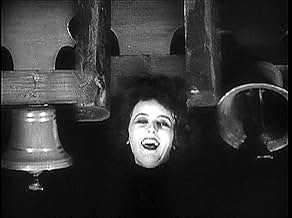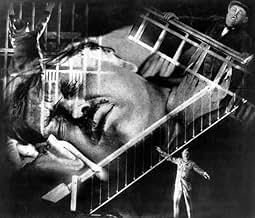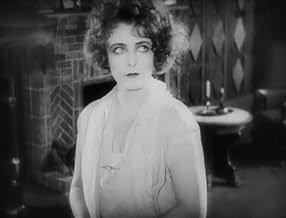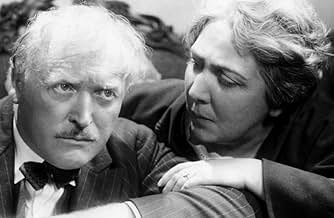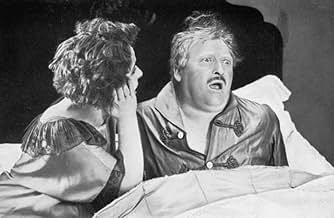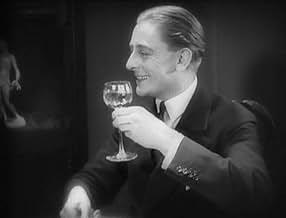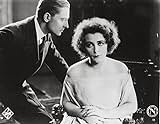Ajouter une intrigue dans votre langueA scientist is tormented by an irrational fear of knives and the irresistible compulsion to murder his wife.A scientist is tormented by an irrational fear of knives and the irresistible compulsion to murder his wife.A scientist is tormented by an irrational fear of knives and the irresistible compulsion to murder his wife.
Avis en vedette
This film appears to be a relative to the common horror film and beautifully carves out its closeness to the psychoanalysis: Everyone who's busy with that genre can benefit from the Pabst film. It becomes pretty obvious during the insane and worth seeing dream sequences which foreshadows an Andalusian dog shot three years later. In a period of several minutes they form a phantasmagoric island within the film, which is continually reverted to during the analytic situations. An aesthetic experience of an unique quality, tremendously powerful in its imagery. But on the whole, the film has the effect of being too reduced, even perhaps reducing, too trimmed and too coarse in respect of content.
This film of G. W. Pabst although far from being one of his best, lays claim to being the first attempt to bring together Expressionism and the psychological theories being expounded at the time by Siegmund Freud and his contemporaries. Producer Hans Neumann much admired Freud's seminal 'Interpretations of Dreams' but faced with Freud's reluctance to become involved he recruited two of his assistants as 'technical advisors'.
Suffice to say it is the dream sequence, filmed in the style of the French avant-garde, that is the source of the film's notoriety, not to mention its menacing images of razors and knives. These elements were to prove influential, not least in the extraordinary 'knife' scene from Hitchcock's 'Blackmail' and perhaps in Salvador Dali's contribution to the same director's 'Spellbound'.
The central figure here is played by the brilliant but controversial Werner Krauss who was never able to shake off the stigma of his collaboration with the Nazis and who, despite the admiration of his fellow actors, was to die in obscurity.
The weakness here lies in the discrepancy in his age and that of his gorgeous young wife played by Ruth Weyher, especially as they are referred to in the script as having been childhood sweethearts!
As the film had a documentary purpose it was marketed by UFA's 'Kulturfilm' department and despite its visual attractions and technical expertise the psychoanalytical aspect is somewhat simplistic and it is hardly surprising that the eminent Dr. Freud distanced himself from it.
Suffice to say it is the dream sequence, filmed in the style of the French avant-garde, that is the source of the film's notoriety, not to mention its menacing images of razors and knives. These elements were to prove influential, not least in the extraordinary 'knife' scene from Hitchcock's 'Blackmail' and perhaps in Salvador Dali's contribution to the same director's 'Spellbound'.
The central figure here is played by the brilliant but controversial Werner Krauss who was never able to shake off the stigma of his collaboration with the Nazis and who, despite the admiration of his fellow actors, was to die in obscurity.
The weakness here lies in the discrepancy in his age and that of his gorgeous young wife played by Ruth Weyher, especially as they are referred to in the script as having been childhood sweethearts!
As the film had a documentary purpose it was marketed by UFA's 'Kulturfilm' department and despite its visual attractions and technical expertise the psychoanalytical aspect is somewhat simplistic and it is hardly surprising that the eminent Dr. Freud distanced himself from it.
There are many people who consider G. W. Pabst to be the finest director of German silent cinema. I am not one of them. I find his movies to be poorly paced and lacking in visual interest. They are kept afloat by their adult subject matter and by the performances of his female stars (Greta Garbo in THE JOYLESS STREET, Edith Jehanne and Brigitte Helm in THE LOVE OF JEANNE NEY, and of course Louise Brooks in PANDORA'S BOX and DIARY OF A LOST GIRL). A prime example of this is THE WHITE HELL OF PILZ PAULU co- directed by Pabst and Arnold Fanck and starring Leni Riefenstahl. Compare the dramatic scenes with the rest of the film and I think you'll see my point which brings me to SECRETS OF A SOUL.
This was Pabst's follow-up to the highly successful JOYLESS STREET (1925). The subject matter and the film's raison d'etre is the "new" subject of psychoanalysis. The breakdown of the protagonist and the fascinatng dream sequences (designed by Erno Metzner) are true to the film's Expressionist roots while the unfolding analysis of his problems are still of interest to a modern audience. There is also an amazing central performance from Werner Krauss as the patient undergoing analysis that really holds the movie together.
Krauss may be the finest German performer from that time period. He has a greater range than Emil Jannings and is less stylized than Conrad Veidt. Unfortunately very little of his work survives and his most famous role (CABINET OF DR CALIGARI) doesn't do him justice. This film does. Also check out his Iago in the 1922 version of OTHELLO and Orgon in the 1925 TARTUFFE (both opposite Jannings). SECRETS OF A SOUL is part of the Kino set GERMAN EXPRESSIONISM which contains 3 other films (CABINET OF DR CALIGARI, WARNING SHADOWS, and THE HANDS OF ORLAC). All of these films can be obtained separately although if you don't have the others I highly recommend the set...For more reviews visit The Capsule Critic.
This was Pabst's follow-up to the highly successful JOYLESS STREET (1925). The subject matter and the film's raison d'etre is the "new" subject of psychoanalysis. The breakdown of the protagonist and the fascinatng dream sequences (designed by Erno Metzner) are true to the film's Expressionist roots while the unfolding analysis of his problems are still of interest to a modern audience. There is also an amazing central performance from Werner Krauss as the patient undergoing analysis that really holds the movie together.
Krauss may be the finest German performer from that time period. He has a greater range than Emil Jannings and is less stylized than Conrad Veidt. Unfortunately very little of his work survives and his most famous role (CABINET OF DR CALIGARI) doesn't do him justice. This film does. Also check out his Iago in the 1922 version of OTHELLO and Orgon in the 1925 TARTUFFE (both opposite Jannings). SECRETS OF A SOUL is part of the Kino set GERMAN EXPRESSIONISM which contains 3 other films (CABINET OF DR CALIGARI, WARNING SHADOWS, and THE HANDS OF ORLAC). All of these films can be obtained separately although if you don't have the others I highly recommend the set...For more reviews visit The Capsule Critic.
At the beginning of the last century, Herr Sigmund Freud was a notorious Austrian neurologist and psychiatrist who was famous for his innovative studies of mental diseases and the complicated unconscious mind. This led him to found psychoanalysis and write "Die Traumdeutung" ( The Interpretation Of Dreams ) a turning point in modern psychiatry that claimed the path to the unconscious could be found in dreams. Since aristocrats usually have nothing in their minds, psychoanalysis could do little to fill such a void but was very useful for average people whose more accessible simple minds made them good subjects for these innovative psychiatric methods.
"Geheimnisse Einer Seele" ( Secrets Of A Soul ) (1926) , directed by Herr G. W. Pabst, an Austrian like Herr Freud, is about this new psychoanalysis, a subject in fashion in Germany due to the complex and confused Teutonic minds, that Herr Pabst efficiently and aseptically describes in this film.
The film is famous for its notorious dream sequence in which a chemistry professor's unconscious fears come to the surface and threatens his marriage. It is all connected to an incident in the neighbourhood and the return of his wife's cousin from India.
The first half of the film shows the tranquil and bourgeois life of the professor together with his wife and the (at first) unimportant events that little by little will affect the professor's unconscious and will take shape in a traumatic dream. This is the most unique and interesting part of the film, the late Expressionist dream sequence, a nightmare, a nonsense puzzle that during the second half of the film will be analyzed and described with the help of a psychoanalyst, natürlich!.
Herr Pabst, due to his Teutonic and organized human nature, describes and solves every little detail shown during the powerful dream sequence with the knowledgeable help of the psychiatrist of the film; a coherent, logical and aseptic analysis that lacks emotion and rhythm so there is no room for mystery. The story also has a conservative and too conventional happy ending that throws the film a bit off balance and is too predictable given the odd subject matter.
That's what happens when you are an open-minded and common person, your innermost secrets are easily revealed, so unlike the wicked, empty and inscrutable aristocratic minds.
And now, if you'll allow me, I must temporarily take my leave because this German Count must wake up.
Herr Graf Ferdinand Von Galitzien http://ferdinandvongalitzien.blogspot.com/
"Geheimnisse Einer Seele" ( Secrets Of A Soul ) (1926) , directed by Herr G. W. Pabst, an Austrian like Herr Freud, is about this new psychoanalysis, a subject in fashion in Germany due to the complex and confused Teutonic minds, that Herr Pabst efficiently and aseptically describes in this film.
The film is famous for its notorious dream sequence in which a chemistry professor's unconscious fears come to the surface and threatens his marriage. It is all connected to an incident in the neighbourhood and the return of his wife's cousin from India.
The first half of the film shows the tranquil and bourgeois life of the professor together with his wife and the (at first) unimportant events that little by little will affect the professor's unconscious and will take shape in a traumatic dream. This is the most unique and interesting part of the film, the late Expressionist dream sequence, a nightmare, a nonsense puzzle that during the second half of the film will be analyzed and described with the help of a psychoanalyst, natürlich!.
Herr Pabst, due to his Teutonic and organized human nature, describes and solves every little detail shown during the powerful dream sequence with the knowledgeable help of the psychiatrist of the film; a coherent, logical and aseptic analysis that lacks emotion and rhythm so there is no room for mystery. The story also has a conservative and too conventional happy ending that throws the film a bit off balance and is too predictable given the odd subject matter.
That's what happens when you are an open-minded and common person, your innermost secrets are easily revealed, so unlike the wicked, empty and inscrutable aristocratic minds.
And now, if you'll allow me, I must temporarily take my leave because this German Count must wake up.
Herr Graf Ferdinand Von Galitzien http://ferdinandvongalitzien.blogspot.com/
Le saviez-vous
- AnecdotesSigmund Freud, whose book "The Interpretation of Dreams" largely influenced this film, was approached to serve as a consultant on psychoanalysis. Freud declined, believing that film could not capture the complexities of the science of psychoanalysis.
- Autres versionsThere is an Italian edition of this film on DVD, distributed by DNA Srl: "I MISTERI DI UN'ANIMA (1926) + OMBRE AMMONITRICI (1923)" (2 Films on a single DVD), re-edited with the contribution of film historian Riccardo Cusin. This version is also available for streaming on some platforms.
- ConnexionsEdited into Die Geschichte des erotischen Films (2004)
Meilleurs choix
Connectez-vous pour évaluer et surveiller les recommandations personnalisées
Détails
- Durée
- 1h 37m(97 min)
- Mixage
- Rapport de forme
- 1.33 : 1
Contribuer à cette page
Suggérer une modification ou ajouter du contenu manquant

